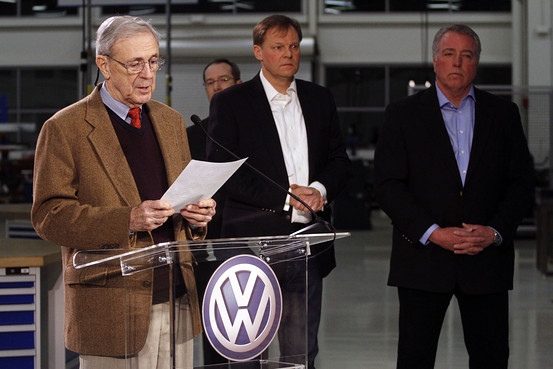News
Unions Say No Retreat in South After VW Defeat

HOUSTON—Union leaders who gathered at their winter strategy meeting touted stories of their success organizing workers in the South, in an apparent effort to quell speculation that the UAW’s big organizing defeat in Tennessee last week means organized labor can’t penetrate the region.
The union officials, who had a press conference Tuesday for reporters about Southern organizing, said they won’t retreat after the United Auto Workers’ loss last week, when workers at a Volkswagen plant in Chattanooga rejected UAW membership by a vote of 712-626. Labor leaders blamed the loss on an anti-union campaign led by Republican Sen. Bob Corker, other Tennessee Republicans, and conservative lobbyists. Despite the loss, workers in the South are “certainly not going to be deterred” from joining unions, said Elizabeth Bunn, the organizing director for the AFL-CIO, which is conducting the Houston meeting.
RoseAnn DeMoro, executive director of the National Nurses United, said her union has organized 7,000 nurses over the past three years in Florida and Texas combined. The frustrations that drove those nurses to organize are no different than gripes that nurses in California had before they joined the union, Ms. DeMoro said. “Nurses are angry everywhere,” she said, calling claims of regional divides “artificial.” The union is currently trying to organize 4,000 nurses in Orlando who work for one of the state’s largest not-for-profit hospital systems, she said, and added that they are receptive.
Communications Workers of America President Larry Cohen said his union has done most of its organizing in the South over the past decade, “not because we focused on the South but because we focused on certain kinds of work that was growing” in that region, he said. Mr. Cohen said the union of roughly 700,000 members in the U.S. and Canada has about 150,000 workers in the Southern U.S., including at AT&T Mobility. The union represents workers at that company in more than a half-dozen Southern states, including Alabama, Tennessee and Georgia, according to the union’s website.
Still, anti-union sentiment is strong in the South and unions generally represent far fewer members there than in other regions. The AFL-CIO announced a plan last year to start focusing more on Southern organizing and politics, saying the region is a prime area for expansion given its growth in jobs and population. Some labor experts believe unions will need to determine how to counter outside forces with some political clout of its own in the South, perhaps before undertaking new major organizing campaigns.
Some anti-union groups say the UAW loss indicates that unions lack value to workers, and that the Chattanooga workers rejected the UAW on their own, not because of outside forces.
The AFL-CIO’s Ms. Bunn disagrees.
“They ran a fabulous campaign,” she said of the UAW. “The message here is that workers are not going to tolerate that [outside pressure] and that we’re coming back,” said Ms. Bunn.